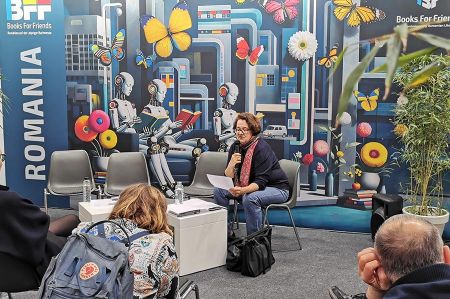Readings and lectures during the Leipzig Book Fair
- Written by Portal Editor
Book fairs such as those in Leipzig or Frankfurt, but also increasingly publishers and even smaller bookstores, organize readings primarily for marketing reasons in order to present a newly published book to a broad public and promote it.
Readers, on the other hand, often attend readings because they can experience the authors personally and perhaps receive a personal dedication with a signature in the newly purchased book. Seen this way, it is often a win-win situation.
From the author's point of view, readings can serve as a direct exchange
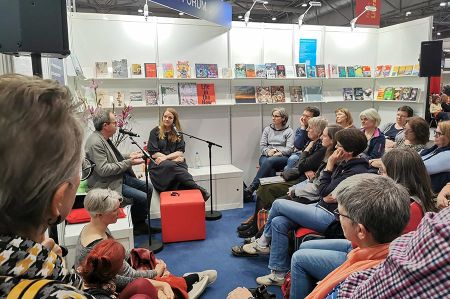 This was observed many times during our last walk through the book fair in Leipzig, because at almost every publishing stand there were rows of chairs of different sizes with a podium and microphone system.
This was observed many times during our last walk through the book fair in Leipzig, because at almost every publishing stand there were rows of chairs of different sizes with a podium and microphone system.
Each of the authors we observed has their own style, not only of writing, but also of how they present their works live and in front of an audience and exchange ideas with the audience, even if they do not speak German.
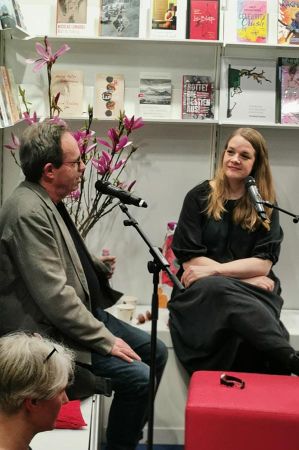 From the author's perspective, readings can serve as a direct exchange between the author and the audience, because the author receives direct feedback on his texts, which he can continue to process in the future. In addition, texts can have a completely different effect when they are read out loud.
From the author's perspective, readings can serve as a direct exchange between the author and the audience, because the author receives direct feedback on his texts, which he can continue to process in the future. In addition, texts can have a completely different effect when they are read out loud.
Particularly in the areas of poetry and spoken word, texts are also specifically designed for oral presentation. Some authors - similar to music groups - are known for their special live performances such as Harry Rowohlt or the Inspector Kluftinger authors Michael Kobr and Volker Klüpfel.
Above all, Wolfgang Fitzek should perhaps be mentioned at this point, who even fills large halls for reading lectures.
“The Noise of Life” by Jörg Hartmann
 Particularly in the area of poetry and spoken word, texts are specifically designed for oral presentation, because the sound of speech plays an important and sometimes predominant role, for example in the avant-garde movements of the 20th century (Dada, Futurism). The Viennese group around H.C. Artmann, Konrad Bayer and Gerhard Rühm, concrete poetry (Max Bense, Eugen Gomringer, Ernst Jandl, Franz Mon and others) and the French sound poets (poètes sonores) work with the sound of language.
Particularly in the area of poetry and spoken word, texts are specifically designed for oral presentation, because the sound of speech plays an important and sometimes predominant role, for example in the avant-garde movements of the 20th century (Dada, Futurism). The Viennese group around H.C. Artmann, Konrad Bayer and Gerhard Rühm, concrete poetry (Max Bense, Eugen Gomringer, Ernst Jandl, Franz Mon and others) and the French sound poets (poètes sonores) work with the sound of language.
Actors often also read texts (or even write scripts themselves, as we already learned with “The Noise of Life” by Jörg Hartmann by well-known authors, plays that have not yet been staged (stage reading) or scripts that have not yet been filmed (“readings”). -Row). This is useful for foreign language authors.
With poetry slam or Open Mike (open microphone), a type of reading was established in Germany in the 1990s that does not focus on a single author, but on the reading event.
Rhapsodes, bards or storytellers
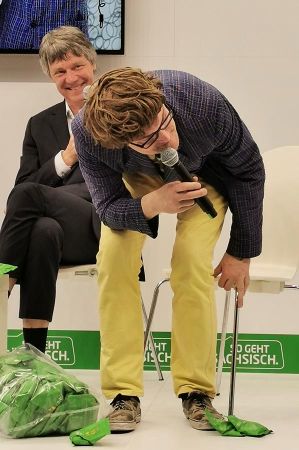 A variation of public reading is reading in internet media and virtual worlds such as Second Life. Often even live on the radio or TV. The listener is offered new types of communication. This means that what you hear can be commented on directly in a chat with one participant or publicly to all participants without disrupting the flow of the reading.
A variation of public reading is reading in internet media and virtual worlds such as Second Life. Often even live on the radio or TV. The listener is offered new types of communication. This means that what you hear can be commented on directly in a chat with one participant or publicly to all participants without disrupting the flow of the reading.
In this context, reference should be made to the oral tradition (orality) of all literature. In all cultures, rhapsodists, bards and storytellers developed their works during lectures or memorized them and updated them before their listeners.
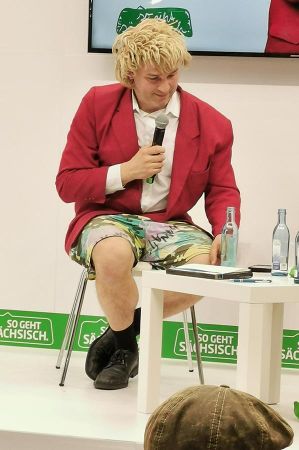 The reading follows this tradition of orality. The list of German-language poets' voices preserved on recordings before 1950 also indicates that the author reciting his own works is by no means a fad.
The reading follows this tradition of orality. The list of German-language poets' voices preserved on recordings before 1950 also indicates that the author reciting his own works is by no means a fad.
It is therefore always a recommendable event to take part in author readings, regardless of whether they take place in libraries, bookstores, in foreign cultural institutes, in literary houses, in reading series of the independent scene or at book fairs. Readings in schools primarily serve to promote reading and, increasingly, to promote integration and relaxation in school classes.
Please read as well:
Salamis on Cyprus - ancient town kingdom near Famagusta
A tour through the old town of Travemünde
-
 Leipzig Book Fair - Different Authors
Leipzig Book Fair - Different Authors
Leipzig Book Fair - Different Authors
Leipzig Book Fair - Different Authors
-
 Leipzig Book Fair - Different Authors
Leipzig Book Fair - Different Authors
Leipzig Book Fair - Different Authors
Leipzig Book Fair - Different Authors
-
 Leipzig Book Fair - Different Authors
Leipzig Book Fair - Different Authors
Leipzig Book Fair - Different Authors
Leipzig Book Fair - Different Authors
-
 Leipzig Book Fair - Different Authors
Leipzig Book Fair - Different Authors
Leipzig Book Fair - Different Authors
Leipzig Book Fair - Different Authors
-
 Leipzig Book Fair - Different Authors
Leipzig Book Fair - Different Authors
Leipzig Book Fair - Different Authors
Leipzig Book Fair - Different Authors
-
 Leipzig Book Fair - Different Authors
Leipzig Book Fair - Different Authors
Leipzig Book Fair - Different Authors
Leipzig Book Fair - Different Authors
-
 Leipzig Book Fair - Different Authors
Leipzig Book Fair - Different Authors
Leipzig Book Fair - Different Authors
Leipzig Book Fair - Different Authors
-
 Leipzig Book Fair - Different Authors
Leipzig Book Fair - Different Authors
Leipzig Book Fair - Different Authors
Leipzig Book Fair - Different Authors
-
 Leipzig Book Fair - Different Authors
Leipzig Book Fair - Different Authors
Leipzig Book Fair - Different Authors
Leipzig Book Fair - Different Authors
https://www.alaturka.info/en/culture/literature/6594-readings-and-lectures-during-the-leipzig-book-fair#sigProIdd4fde8876b
